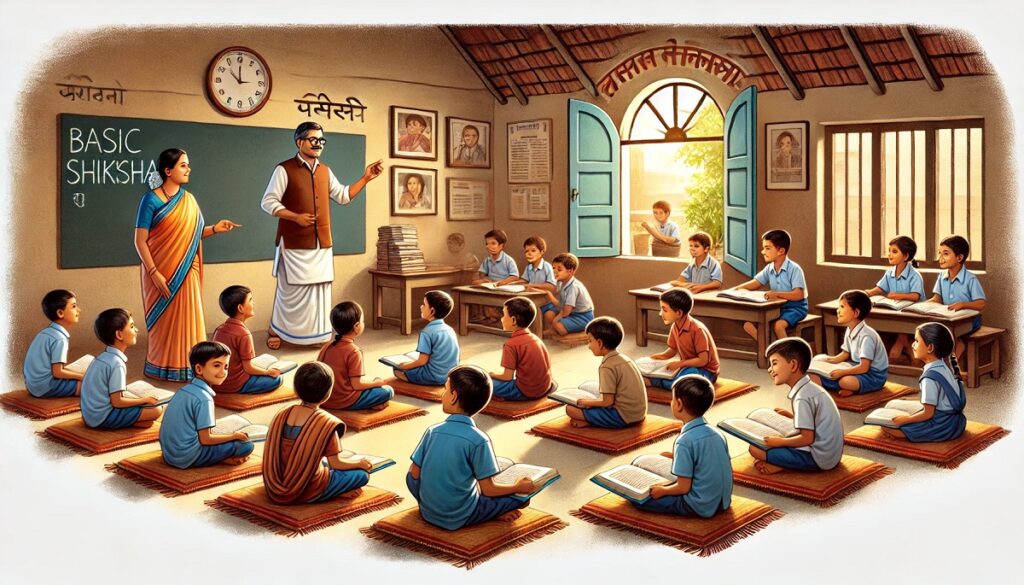Overview of Basic Shiksha
Basic Shiksha News, often translated as primary or foundational education, plays a crucial role in building the educational framework in India. The term primarily refers to the fundamental level of education that aims to instill core skills such as literacy, numeracy, and basic social understanding in young learners. India’s commitment to universal education underscores the importance of Basic Shiksha, especially for disadvantaged communities.
Recent News in Basic Shiksha
Key Policy Changes
Policies aimed at improving Basic Shiksha focus on increasing accessibility, enhancing quality, and promoting inclusivity. Recently, initiatives such as the New Education Policy (NEP) have put a spotlight on revamping traditional teaching methods. NEP 2020, for instance, introduces flexible curricular structures, which cater to diverse learning paces.
New Educational Programs
New programs under Basic Shiksha are designed to modernize India’s educational ecosystem. This includes initiatives like digital classrooms, teacher training, and technology-integrated learning. Programs aim to bridge the gap between rural and urban educational facilities.
Impact of Basic Shiksha Reforms
In recent years, the government has been implementing policies to strengthen the Basic Shiksha framework, focusing on universal access and improving quality. The National Education Policy (NEP) 2020 marks a significant milestone, aiming to reconfigure the educational structure by reducing rote learning and increasing critical thinking and life skills development. To support this, the NEP has introduced foundational literacy and numeracy programs for young learners, ensuring every child achieves minimum proficiency by grade 3.
Another important policy initiative has been the implementation of the Samagra Shiksha Abhiyan, a program targeting school education holistically from preschool to senior secondary level. This integrated approach enables a seamless educational journey, bridging gaps between different educational stages. Additionally, recent policies are looking at alternative modes of instruction for rural areas where internet access is limited, utilizing radio, television, and local teachers to ensure continuity in education.
For Students
For students, the reforms in Basic Shiksha have led to improved learning outcomes. Students in rural areas now have greater access to quality education and resources, thanks to digital learning initiatives and government-funded programs.
For Teachers
Basic Shiksha reforms have greatly impacted teachers by providing them with better training, support, and resources. Continuous professional development programs empower teachers to adapt to modern educational tools and methods, enhancing their ability to teach effectively.
Challenges in Basic Shiksha
Basic Shiksha faces challenges, including limited resources in rural schools, high student-to-teacher ratios, and language barriers. Addressing these issues is critical for ensuring equal educational opportunities across diverse demographics.
The Basic Shiksha landscape has been enhanced by several innovative programs aimed at improving learning quality and accessibility. Programs like the Vidya Pravesh, a three-month school readiness module, provide structured early childhood education to ease children’s transition into primary school. This program is part of the broader Samagra Shiksha initiative and aims to prepare young learners through fun, interactive, and learning-focused activities.
Digital literacy has also become a cornerstone of Basic Shiksha, with programs like DIKSHA (Digital Infrastructure for Knowledge Sharing) enabling teachers and students to access free resources online. The platform provides digital textbooks, instructional videos, and even live classes, fostering an inclusive educational environment. By enhancing digital resources and teacher training, these programs are designed to cater to various learning styles and help bridge the gap between urban and rural schooling.
Future Trends in Basic Shiksha
The future of Basic Shiksha is expected to focus on digital transformation, personalized learning, and increased governmental support. These trends will play a key role in shaping a more accessible and efficient educational system for young learners in India.
The future of Basic Shiksha in India is closely tied to the adoption of technology and digital learning tools. As the government continues to expand internet connectivity to rural areas, more schools are likely to integrate digital platforms and smart classrooms. This shift is expected to make education more engaging and accessible, allowing students to learn at their own pace and catering to diverse learning styles.
Personalized learning is also emerging as a key trend, with the use of AI and data analytics to identify students’ strengths and weaknesses. By tailoring educational content to individual needs, schools can help students achieve better learning outcomes. Additionally, there is a growing emphasis on life skills and vocational training, with programs being introduced to equip students with skills that can be applied in real-world settings.
Sustainability is another priority, with Basic Shiksha programs looking to incorporate environmental education and awareness into the curriculum. By educating students about environmental conservation and sustainable practices, schools are preparing a generation that is conscious of global issues and capable of contributing to a greener future.
The Basic Shiksha sector is also expected to see greater collaboration between public and private organizations, creating a more robust educational ecosystem. These partnerships aim to leverage private sector expertise and resources to strengthen educational infrastructure, training, and curriculum development.
External Links for Authoritativeness and Trustworthiness
Here are some recommended URLs that could add authority and trustworthiness to your Basic Shiksha content:
- Government of India, Ministry of Education – Samagra Shiksha
- National Education Policy 2020 Full Document
- DIKSHA – Digital Infrastructure for Knowledge Sharing
- UNICEF India – Education
- National Institute of Open Schooling (NIOS) – Open Education Resources
These links lead to credible sources, providing insights into the policies, programs, and challenges within India’s Basic Shiksha landscape. They help establish content authority by connecting readers with government publications, reputable educational initiatives, and international perspectives on education in India.


